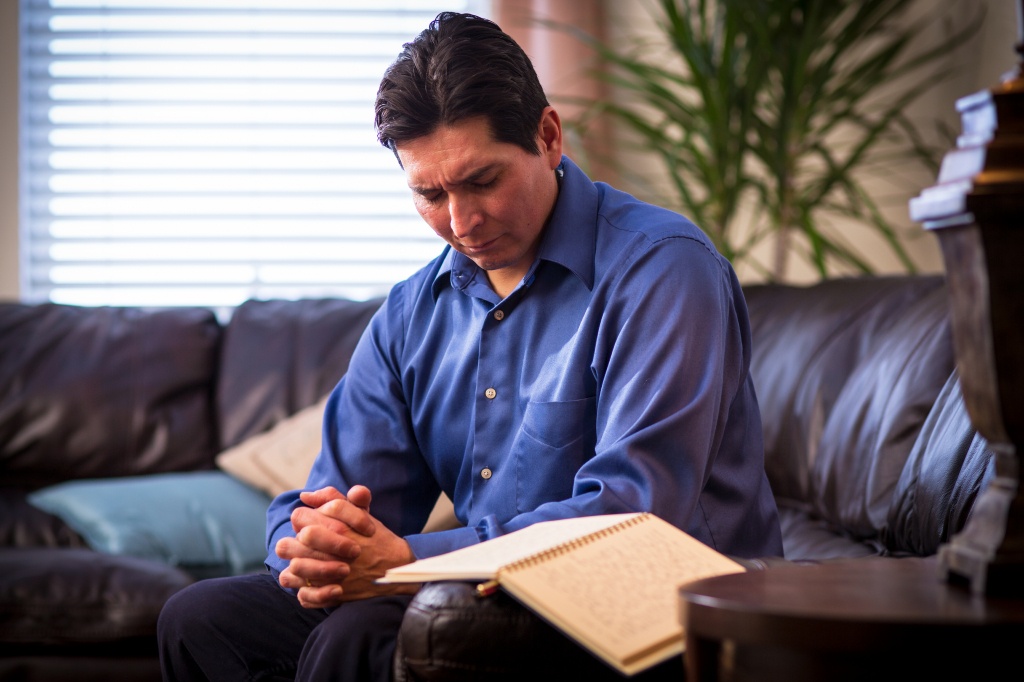I remember the first time I saw negative sentiment override in action, I was a waiter. A couple came in to have dinner and everything was fine at first. They spoke in quiet, civil tones as I took their order. However, as the meal went on, their communication became more and more angry and loud. By the end of the shift they were the last table in the restaurant and I was waiting for them to pay so I could go home. But they seemed more interested in keeping up the battle of dysfunction than anything else. Finally, I got my courage together and timidly asked if I could take care of their check.
 “See, Phil?” the wife asked, “at least this guy knows how to do his JOB.”
“See, Phil?” the wife asked, “at least this guy knows how to do his JOB.”
“And his wife probably supports him even though it isn’t his dream job, right buddy?” The husband asked me.
“Oh, don’t drag him into this,” she shouted. “Why can’t you be a man and pick your own fights?”
and so on.
You, like most of us, have probably seen a couple like that. A couple who once-upon-a-time used to see the positive in each other, and who were wanting to “make it better,” but who just keep falling into that dark space where all they can see is the negatives, and anything positive is literally flipped on its head to be as negative as possible, even if such a perspective wasn’t logical.
With each interaction, each insult, each complaint, these people are training their brains to see the worst, to embrace cynicism, to doubt love, and to feel anger.
That’s Negative Sentiment Override.
Does this sound familiar in terms of how you react to church related stuff? When the bishop announces “Trek” coming up for the youth, do you allow yourself to think “how nice the ward is trying to provide growing experiences” or do you find yourself thinking something like “oh great, another brainwashing event to spread more lies,” followed by hours of seething anger?
Do those negative feelings you have about a few aspects of church history override all the good going on in your ward and stake today?
If that is the case, then maybe it’s time for “couples therapy.”
In this case, the other person in the room with you is God.
And the first step to recovery is being aware of the problem – the behavior and habit – that causes this situation. But simply regulating the negative feelings isn’t enough. For some reason our brains love to remain negative. The best route out of negative sentiment override is building the positive sentiment. It is hard and it takes time, but you can do it.
Practical steps
 Treat it like couple’s therapy – Just as your therapist will help you re-train your brain to think positively about the other in your marriage, you can re-train your brain to think positively and avoid negative sentiment towards the church. If you attend therapy for your family, think of ways to apply what you learn to your attitudes towards God. This re-training of your brain will probably take the form of “cognitive behavioral therapy” which teaches us to recognize destructive thought patterns, stop them, and refocus on healthy patterns. Here are some CBT tips adapted from the University of Washington:
Treat it like couple’s therapy – Just as your therapist will help you re-train your brain to think positively about the other in your marriage, you can re-train your brain to think positively and avoid negative sentiment towards the church. If you attend therapy for your family, think of ways to apply what you learn to your attitudes towards God. This re-training of your brain will probably take the form of “cognitive behavioral therapy” which teaches us to recognize destructive thought patterns, stop them, and refocus on healthy patterns. Here are some CBT tips adapted from the University of Washington:
- Ask yourself “what am I thinking about or what emotions am I struggling with that might be causing me to feel this way?” Take note of any particular thoughts or memories that might give rise to distress. Make a list to help you understand how your emotions and thoughts are connected and what it is that triggers you (and recognize the things that don’t trigger you.) For many people with negative sentiment, the root connects to bad personal experiences in their past.
- Balance your thoughts, and trust that emotions will follow. Think carefully about things that can shine a more balanced light on your perspective towards your faith. For example, if you find yourself swept up in negative emotions about fast and testimony meeting, spend some time thinking critically and recognizing some of the positive parts of the meeting. The “Latter-day Hope” document is meant to help facilitate this “balancing” of negative by helping us see some of the positives. You can make your own personal list of positives, giving them equal time in your thoughts.
- Be patient with yourself. Your goal shouldn’t be to return to an Eden of mental innocence, but rather to find yourself well equipped to handle whatever challenges arise in your faith journey. Focus on small victories. Be proud of positive change, no matter how small. Recognize there are some obstacles that will be harder than others to overcome, and some days will be harder than others.
- Be kind to your faith. It’s easy to get caught up in negative talk without even realizing it. But getting down on your faith or yourself isn’t going to inspire the confidence you need. Be aware of negative thoughts and actively replace them with something more balanced. If the Trek announcement has you riled up, step back, recognize the positive aspects, and breathe.
- Focus on what you love. There are likely aspects of your faith you really do love. Perhaps it’s teaching, perhaps its youth activities, or service. Recognize the genuine moments of joy that come and seek opportunities to do those things regularly.
- Be mindful. For those of us who struggle with “truth claims” it’s easy to get caught up in ruminating on histories, theories, and negative speculation. Be aware of these patterns and align your thinking with what’s happening right now. Ask yourself “are my emotions reflecting what’s going on in this moment?” if not, focus on your senses. What are you seeing and hearing in the moment? Be mindful of the present.
Don’t humanize the inhuman – Why do I say the other person in the room with you is God and not the church? Those who struggle with being in the church find it easier to be critical when they talk about “the Church” as if it is a human being. After all, it’s difficult to ascribe motives to an organizational structure, but it’s easy to feel that this “creature” called The Church has evil intent. The monstrous fabrication of “the church” can soon replace God in our spiritual relationships, leaving us feeling cold and distanced from positive sentiment, and the core of our belief. Remove yourself logically from this perspective and recognize that there are flaws in the membership, leaders, structure and history of the church because the church is made of humans and we are all flawed. As you balance your thoughts, remind yourself that flaws do not equal ill intent, and that the mistakes of individuals do not equate to an evil corporate entity bent on evil doing. Most importantly, the church isn’t God.
Get personal with God and your leaders – Some of the tactics therapists might use will be asking you to describe the motives and goals of the other person. By understanding the why behind a person’s actions, we can learn to forgive and even feel good about where things are. Placing God in the role of the other person in your relationship instead of “the church” will help you better understand motives, which will help you understand methods (and failures). Understanding why God might do what he does is the first step to forgiving Him, and finding peace with the flaws of the church. Similarly, it may help you to consider the Bishop who failed to help you as not an automaton of churchey action, but as the tired and challenged auto mechanic he is. The key to a personal connection is the person.
Look for the positive – I had one missionary companion who was so hard on himself that it was making him depressed and suicidal. His therapists finally said “Okay, we’re going to have a new rule. Every time you realize you’ve started thinking negatively about yourself, you must immediately pull out this notebook and write down 5 positive things about yourself.” Eventually he was able to learn to control the impulse to think negatively by interrupting it with a task that required positive thinking. This may work for you as well. Plus having a notebook full of positive thoughts about the other in your relationship can be a great resource when you have those moments where you just can’t remember why you used to care. This also works for testimonies and belief. Again, this is not about brainwashing yourself into being some sort of cheerfulness zombie. Instead it’s about seeing clearly – to accurately recognize the size and importance of the negatives and not blowing them out of proportion. For some reason, our brains are best prepared to think fairly when we escape the trap of cynical thinking.
Forgive little things – think about if there are things which you can forgive which you can easily identify as honest mistakes. For example, perhaps you feel anger about some of your leaders teaching something you have learned is false, but, on consideration, you realize that it’s simply because they don’t know and the person who wrote the manual had no way of knowing back in 1980 when he wrote it. It’s an understandable mistake, not a malicious concealment of truth. Maybe you can’t forgive “the big things” but maybe today you can forgive this one little thing.
Avoid toxicity – Finally, think back to this couple I described at the restaurant. They arrived trying their hardest to have a positive night out, a date that would restore their romance just a bit. Though they failed, they tried, and maybe the next time would go better. But imagine if they sat down and instead of taking their order I sat down next to the husband and gave him extra ammo to use against his wife. “look at her hair. Why doesn’t she even try to care about her looks. She says she supports you, but here’s a list of 90 times where evidence proves she doesn’t support you. When she was a teenager she said she’d never be happy married to somebody earning less than 75k a year. Was she lying then or is she lying now?” If struggling marriages had communities like the ex-Mormon groups, where everybody endlessly criticizes the institution and is focused on providing more ammo only to the negative experiences, none of them would last. You can not hope to have your perspective towards the church be positive, much less fair, if you surround yourself, even momentarily, with those who feed your negative sentiments and insist it’s “the truth.” You can still be perfectly aware of the truth and not feed toxicity.

Communicate – No relationship ever recovered without communication. Be willing to get on your knees and talk, really talk, to God. Explain what you’re feeling, what you’re going through, and what you want. Be honest. Tell him what you’re doing and why. Be open to having ideas and feelings that may be from him. Read scriptures and see if there may be a message from him to you.
Seek professional help for your family. Apply what you learn to your covenant relationship with God. You can find peace and love return again, and even a stronger faith that is aware of flaws, while still able to recognize the miracles.
*note: this article was updated to reflect good feedback from the reddit community on making more clear the distinction between God and the church. Thanks for all your help and encouragement.













